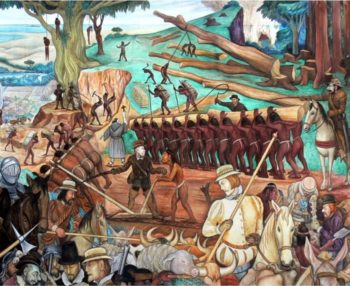12 de Octubre: Día de la Resistencia Indígena Posted by Anais on Oct 12, 2020 in Spanish Culture
It may not be so contentious an issue from a North American standpoint, but for Latin-Americans everywhere this question has always been significant: What is the most appropriate name for October 12th?
Throughout the 20th century, how Columbus Day should be called became an important subject when one remembers what it was supposed to be commemorated there: Spain’s arrival in the Americas on October 12th, 1492, with explorer Cristóbal Colón (the Spanish name for Christopher Columbus) at the helm of the expedition.
Because of ethical, respect and moral reasons, there is a new whole perspective regarding el día de Colón, as it is considered wrong to celebrate the Spanish—and subsequently European—conquest of “el Nuevo Continente” (the New Continent, in reference to the Americas).
This national holiday is viewed as a commemoration of Indigenous peoples’ struggle against foreign invaders and a chance to remember—in the most respectful light—all the Aboriginal peoples that were exterminated in the centuries after Columbus’s endeavor. In some instances, it is understood as the moment when two very different cultures met, and the many results of that historical clash.
That is the reason why, in recent decades, many Spanish-speaking countries around the globe have been changing the name of this holiday, in order to shine more light on its positive aspects or even long-ignored elements. Let’s check some of the most well-known.
Día de la Raza
As the most common name for this holiday, “Día de la Raza” (Day of the Race) is the official name used in Colombia, Honduras, Mexico, Panama, El Salvador, and in some states of the US. One justification for using the term “race” is that it would be a reference to the “Ibero-American race”; in other words, the cultural mixture of many different people on the Americas.
Día de la Hispanidad
“National Day of Spain and Hispanic Day” was the name chosen for the Spanish government to refer to October 12th from 1981 until 1987, when it was again modified to the current “National Day of Spain”. However, “Hispanic Day” is still widely accepted there, and is even the official name for it in Guatemala.
Día del Respeto a la Diversidad Cultural
In 2010, the Argentinean government decided to replace the name “Día de la Raza” (Day of the Race) to “Día del Respeto a la Diversidad Cultural” (Day of Respect of Cultural Diversity), as it showed a less prejudiced conception of peoples and the way they can peacefully coexist. Nonetheless, on the other side of the Río de la Plata, Uruguayans just preferred “Día de la Diversidad Cultural” (Day of Cultural Diversity).
Día del Encuentro de Dos Mundos
Informally known as “Día de la Raza”, Chile picked the name “Día del Encuentro de Dos Mundos” (literally, Day of the Meeting of Two Worlds) in 2000 to change the traditional, official name for this day since 1922: “Aniversario del Descubrimiento de América” (that is, the Anniversary of the Americas’ Discovery).
Día de los Pueblos Originarios y del Diálogo Intercultural
In the case of Peru, October 12th is not a legal holiday, but it is officially commemorated since 2009 as the “Día de los Pueblos Originarios y del Diálogo Intercultural” (“Day of the Aboriginal Peoples and Intercultural Dialogue”).
Día de la Descolonización
In Bolivia, October 12th was decreed in 2011 to be celebrated as the “Día de la Descolonización” (Decolonization Day), after having being officially known as “Día de la Liberación, de la Identidad y de la Interculturalidad” (“Day of Liberation, Identity and Interculturalism”).
Día de la Resistencia Indígena
Venezuela and Nicaragua chose for their part to honor the Pre-Columbian peoples by highlighting their struggle against the European advance on their territories. “Día de la Resistencia Indígena” (“Day of Indigenous Resistence”) has been the name of the holiday in Venezuela since 2002. Meanwhile, Nicaragua made it a bit more inclusive: there, it is called “Día de la Resistencia Indígena, Negra y Popular” (Day of the Indigenous, Black and the People’s Resistance).
How do you think this day should be called? What do you do to commemorate this date? Share your thoughts on the comment below!

Build vocabulary, practice pronunciation, and more with Transparent Language Online. Available anytime, anywhere, on any device.




